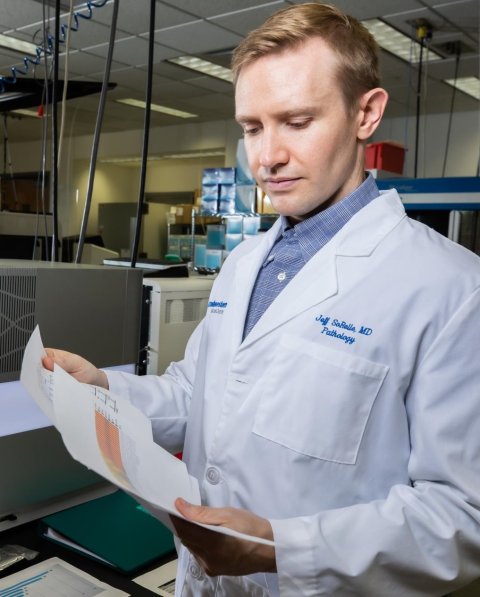Article • Preventing clinical errors
Supporting transgender health in the clinical laboratory
Clinical laboratories need to be proactive to attract transgender patients for testing and to ensure that they are comfortable with the services provided. This issue is of great importance to the American Association for Clinical Chemistry (AACC), which conducted a scientific session on transgender health at its recent annual meeting in Chicago.
Report: Cynthia E Keen
Image source: Unsplash/Jordan McDonald
Jeffrey A. SoRelle, MD, of the Department of Genomics and Molecular Pathology at the University of Texas Southwestern Medical Center in Dallas, discussed the challenges labs have in caring for transgender patients. Electronic health records (EHR), auto-reject rules, mismatches in names versus chromosomes, and tumour data that do not match sex, are key issues that need to be dealt with to prevent potential clinical errors and confusion in a patient’s electronic medical record (EMR).
Expand EMR info to reflect patient diversity

Protocols to acquire additional fields in the demographics section of a patient’s EMR should be implemented by all healthcare organizations, even though these may not be legally required by governmental agencies. The World Professional Association for Transgender Health recommends that data include entries for assigned sex at birth, gender identity, legal and preferred names, and pronoun preference. EMR data needs to interface with other systems comprising an EHR, such as laboratory (LIS) and radiology information systems (RIS). ‘An ideal patient EMR has a gender identity section that includes a patient’s gender preference, sex assigned at birth, and legal name, if different from their preferred name, which may be necessary for health insurance processing,’ explained SoRelle. ‘Gender identification data is important not only for pathology, but to prevent confusion and delays,’ he said. ‘Electronic processes such as billing, filling prescriptions, and printing lab labels can be driven on the back end by legal sex and legal name fields.’
However, legal names and natal sex should only be used for billing purposes, he cautioned. ‘And it is very important to explain to transgender patients the very valid clinical reasons for incorporating this information. This conversation can be done by a nurse or phlebotomist and scheduled as part of the lab appointment. It is very important that patients feel comfortable about adhering to the recommended requirements for lab tests. Alternatively, since two patient identifiers are required to draw blood, alternative identifiers such as date of birth, medical record number, or address could be used.’
It is essential for transgender patients prescribed gender-affirming therapies, specifically exogenous hormones like testosterone and estrogen and androgen blockers, to have regular clinical monitoring and laboratory testing to assess bodily change and possible adverse effects of medication. Laboratory monitoring should be based on known risks of hormone therapy, the specific hormone regimen, and a patient’s individual co-morbidities and risk factors. Transgender patients, out of a lack of trust of the medical system, may skip scheduled lab tests, and risk developing cardiovascular disease, venous thromboembolism, cancers, prolactinoma, and osteoporosis, as well as other health risks.
Improper sex flagging can lead to rejection of vital tests
Be aware that if a transgender woman has had her sex and name changed, an order for a prostate biopsy or a molecular test of a prostate biopsy may be auto-rejected. And any transgender person with a cervix needs annual screening for HPV
Jeffrey A. SoRelle
As an example: spironolactone is the most commonly prescribed anti-androgen for transgender women. Lab tests 90 days after the start of this therapy are critically important to identify patients with limited renal function who are at risk for electrolyte imbalance such as hyperkalaemia, the accumulation of a dangerous level of potassium which can cause irregular heartbeats, fainting, cardiac arrest, or death. ‘Lab staff can also remind transgender patients of screening exams they don’t think they need, such as having mammograms for breast cancer screening, which can be caused by years of feminine hormone therapy,’ said SoRelle. ‘Prostate cancer screening is also essential. To date, ten cases of prostate cancer have been reported in transgender women. But be aware that if a transgender woman has had her sex and name changed, an order for a prostate biopsy or a molecular test of a prostate biopsy may be auto-rejected. And any transgender person with a cervix needs annual screening for HPV.’
SoRelle offered this additional advice: Do not cancel lab tests based on assumed sex specificity but do ensure proper flagging of tumour and pregnancy-related markers are implemented without sex specificity. Recognize that reference intervals for transgender patients have not been established. Use your clinical judgement and hormone status to assess abnormal laboratory values.
Profile:
Jeffrey A. SoRelle, MD, is an Assistant Instructor of Pathology in the Department of Genomics and Molecular Pathology at the University of Texas Southwestern Medical Center in Dallas. He is director of the SoRelle Lab, which studies the mechanisms of allergy at a genetic level, to discover and translate the lab’s findings into diagnostic and therapeutic solutions for patients with allergy.
18.08.2022











